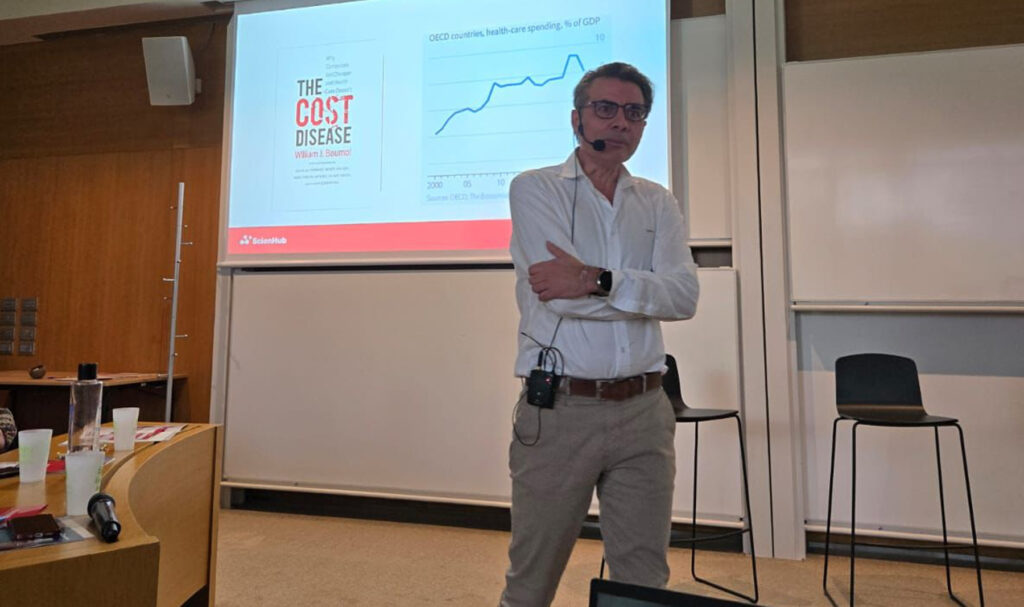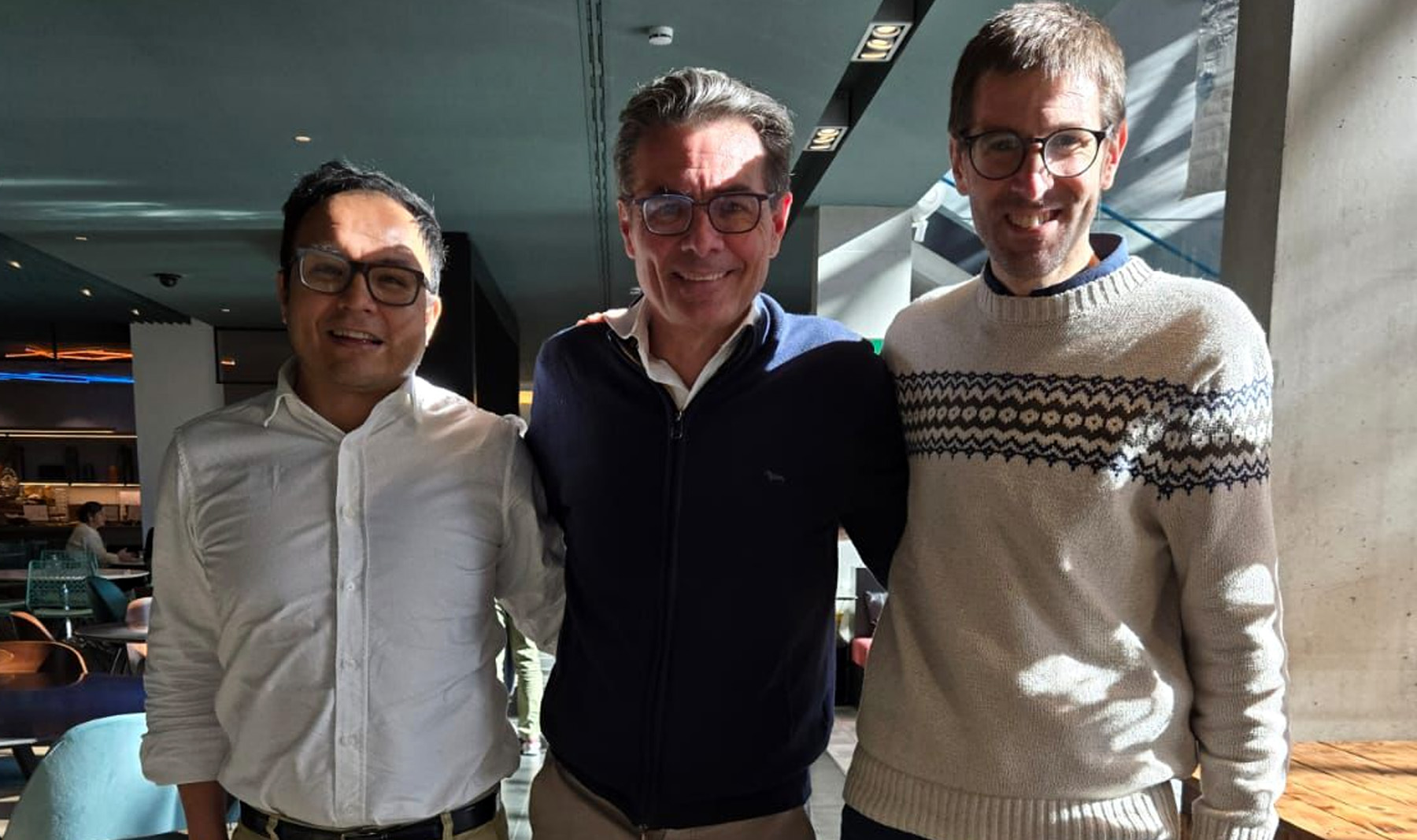Carla Simón and Bonaventura Clotet: a different perspective, when AIDS touches you closely
04/12/2025
Alejandro Gaviria, former Minister of Health of Colombia, is one of those people who have left an indelible mark in the fight for a fairer world. His work has been key in facilitating access to essential medicines, such as antiretrovirals for HIV, for underprivileged individuals. His commitment to public health led him to participate in the second edition of the Revolution conference, a space dedicated to analyzing current advances and challenges in HIV treatment and prevention.
The Revolution conference is organized by ScienHub Education, the training services platform of the Fight Infections Foundation, with the aim of bringing together experts from various centers and hospitals to discuss key issues related to HIV. On this occasion, one of the invited speakers was Mr. Alejandro Gaviria, a Colombian economist, engineer, and writer, with whom we had the pleasure of speaking to gain insight into how he tackled the challenge of leading the Ministry of Health and Social Protection in his country.
During the six years I served as Colombia’s Minister of Health (2012-2018)—making me the longest-serving minister in that position—I prioritized tackling two major challenges: access to medication and the financial sustainability of the healthcare system.
On one hand, ensuring that the system had sufficient resources to meet the population’s needs was a crucial task. On the other, securing equitable access to medicines for all citizens, regardless of their socioeconomic status or place of residence, was a tremendous challenge in a country with deep territorial inequalities between urban centers and peripheral areas.
Undoubtedly, these were complex challenges, but they were also essential for advancing toward a fairer and more sustainable healthcare system.
Based on your experience, how has public policy influenced accessibility and equity in antiretroviral treatments in middle- and low-income countries?
In Latin America and low-income countries, public health policies have been strengthened in recent years. I believe there have been undeniable advances in many health indicators, as well as in access to essential medicines, including antiretrovirals. However, the main challenge now lies in incorporating new technologies and managing the growing financial pressure they impose on healthcare systems.
Colombia’s case is particularly complex. In my country, about 50% of workers do not have formal employment, meaning their access to social security is not always guaranteed. One of our biggest challenges was ensuring that this large sector of “informal” workers could be included in the public healthcare system, with the same coverage and rights as the rest of the population.
I return to a theme I have already mentioned: technological pressure on healthcare systems. A clear example of this challenge is the case of medications for Hepatitis C.
When we analyzed the situation in Colombia, we quickly calculated how many people needed access to this treatment. We soon realized that if we had treated all patients at once, the healthcare system would have collapsed.
So, how do we effectively manage these transitions? Addressing technological pressure was a crucial challenge. Although we successfully implemented a strategy, it was a fragile victory: the introduction of new medications can create financial sustainability issues, ultimately threatening the hard-earned progress in healthcare equity.
In fact, the healthcare system has advanced significantly in terms of social equity, but the constant arrival of new drugs presents an ongoing challenge: ensuring fair and equitable distribution to all people.
In Colombia, we face two major barriers.
Additionally, treatment adherence remains a challenge. In some cases, patients do not follow their medication regimen properly, and some even resell their medicines on the illegal market, which further complicates the problem and undermines efforts to guarantee equitable access and effective disease control.
Personally, I went through a unique and difficult experience: while serving as Minister of Health, I was diagnosed with cancer. This put me in an unusual dual position—leading public health policies while undergoing intensive treatment for seven months.
It was an extremely complicated situation because, in a way, I became “the patient” of Colombia. My illness was followed by the entire country, almost like a soap opera, with media exposure that made the process even more challenging.
Regarding HIV, I have a very close connection to this field. One of my best friends is Colombia’s leading HIV specialist, equivalent to Dr. Bonaventura Clotet here. Ironically, when I was a cancer patient, I nearly died from an infection—I suffered septic shock. And it was precisely him, with his experience and knowledge, who ultimately saved my life.
I would like to highlight some bioethical debates I had to face during my time as Minister of Health in Colombia. These are fundamental questions that, despite their importance, are often overlooked in public discussions. However, I firmly believe they should be at the core of the debate, because many of the sustainability issues in healthcare systems and the challenges faced by low-income countries stem from unresolved bioethical dilemmas.
For example, how do we justify the inclusion of a new cancer drug that costs $1,000 per month and clinically only extends survival by an average of 25 days? How do we ethically and responsibly make the decision to say “no” in such cases?
Another relevant dilemma is healthcare service costs. If I am a public payer, why should I fund a healthcare provider that spends three times more than another equivalent institution to offer the same service?

Alejandro Gaviria delivering his talk at the Revolution conference
04/12/2025
24/11/2025
24/11/2025

Share